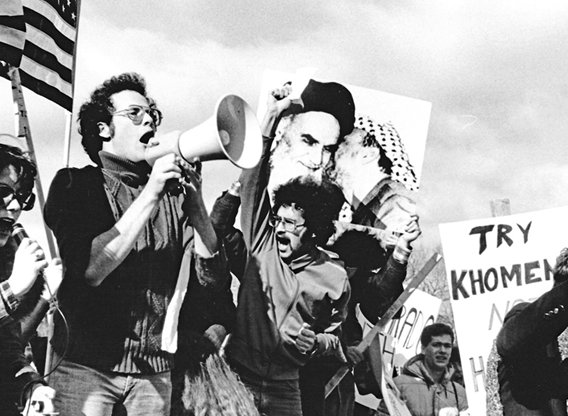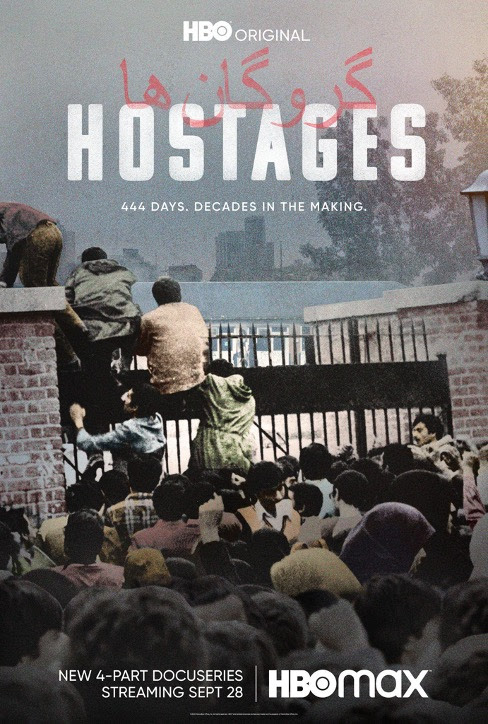Eye For Film >> Movies >> Hostages (2022) Film Review
Hostages
Reviewed by: Donald Munro

On the 4th of November, in the aftermath of the 1979 Iranian revolution, the 'Muslim Student Followers of the Imam's Line' staged a sit in at the American embassy in Tehran. They were protesting about the Americans providing asylum to Mohammad Reza Pahlavi, the deposed Shah of Iran. Pahlavi's brutal reign was characterised by gross inequality, oppression, torture and killing. When the students detained members of the embassy staff, the protest took on a life of its own, turning into a 444 day long hostage crisis.
The HBO documentary series Hostages covers some of the events in the lead up to the crisis, the 444 days, and its immediate aftermath. It consists of about 4 hours of historic footage and interviews with many of the people involved: hostages, students, politicians, and journalists. Combined with an explanatory voiceover, it does a good job of laying out the timeline of events. The interviewees put a human face on the historic events, describing their actions, emotions and motivations. The contemporaneous footage helps build an easily understood timeline of events, from the excesses and cruelty of the Shah's reign to the immediate effects of the crisis on both American and Iranian politics. The problem with it is that its a bit like learning lists of kings or dates of battles. It doesn't place events in context. Its all about the what and not the why. For instance, why would a seemingly progressive and western-leaning country harbour such resentment for the West?
Persia, as it was then known, was progressive. In 1909 it became a democracy: "The Triumph of Tehran." The British and Russian governments didn't want there to be democracy in the Middle East so drew their plans against it. In 1911 Russia invaded. After the October Revolution, Russia pulled out. British rule resulted in a famine that killed millions (estimates range from 20% to 50% of the population). Britain pulled out in 1921, just in time to make a mess of Palestine. In 1941 it was time for Britain and Russia to do it all again, this time for oil. Time for another famine. After Iran got its freedom and democracy back, it decided to take back its oil. The British government felt that this was against its interests in the region so sponsored a coup to put the Shah into power. After it failed, Britain got the USA to do the dirty work. With this history, it's little wonder that some Iranians felt resentment towards the West. The documentary, however, only briefly discusses America's part in the coup and its involvement, along with Israel, in the setting up of SAVAK, the Shah's secret police.
For a documentary focused on facts rather than analysis, Hostages can be quite selective about the facts that it uses. The account of Operation Eagle Claw, the American military's doomed operation to rescue the hostages, fails to mention the American troops' kidnap of 44 Iranian civilians and the murder of another. The operations failure was not just humiliating for America, as portrayed, but also, in the eyes of many parts of the world, it squandered America's high moral ground. It can also misrepresent facts. There's plenty of repetitious footage of crowds chanting "Marg bar Amrika," translated literally as "Death to America". In English swear words tend to focus on sex and bodily functions. In Farsi the focus is on death. An idiomatic translation of the phrase might be "Fuck America". That is the difference between anger and homicidal fanaticism.
Much of the historic footage used in Hostages is of very poor quality. There is a lot of ghosting and other artefacts including flashing patterns which should probably come with an epilepsy warning. Watching this on a modern screen can be quite straining on the eyes. Something should have been done to clean up the footage to an acceptable level.
Hostages does a little to explore the legacy of the crisis. The election of Reagan is covered and the Iran-Contra affair is touched upon, as is the way in which it helped cement the power of Ayatollah Khomeini. Iran's permanent pariah status, first as a country trapped outside the Cold War, and then being internationally ostracised as part of the 'axis of evil', isn't commented upon. Nor is the long term effect of the trove of intelligence documents the Iranians recovered from the embassy, a selection of which were published as Documents From The US Espionage Den (all 24 volumes of which are now freely available).
As I am writing there are protests across Iran. Mahsa Amini was tortured and murdered by the police after she was detained for wearing her burka 'too loosely'. Dozens of those protesting about her death have been killed by the Ayatollah's security forces - the security forces of a regime that was ensconced by the hostage crisis.
Reviewed on: 28 Sep 2022















